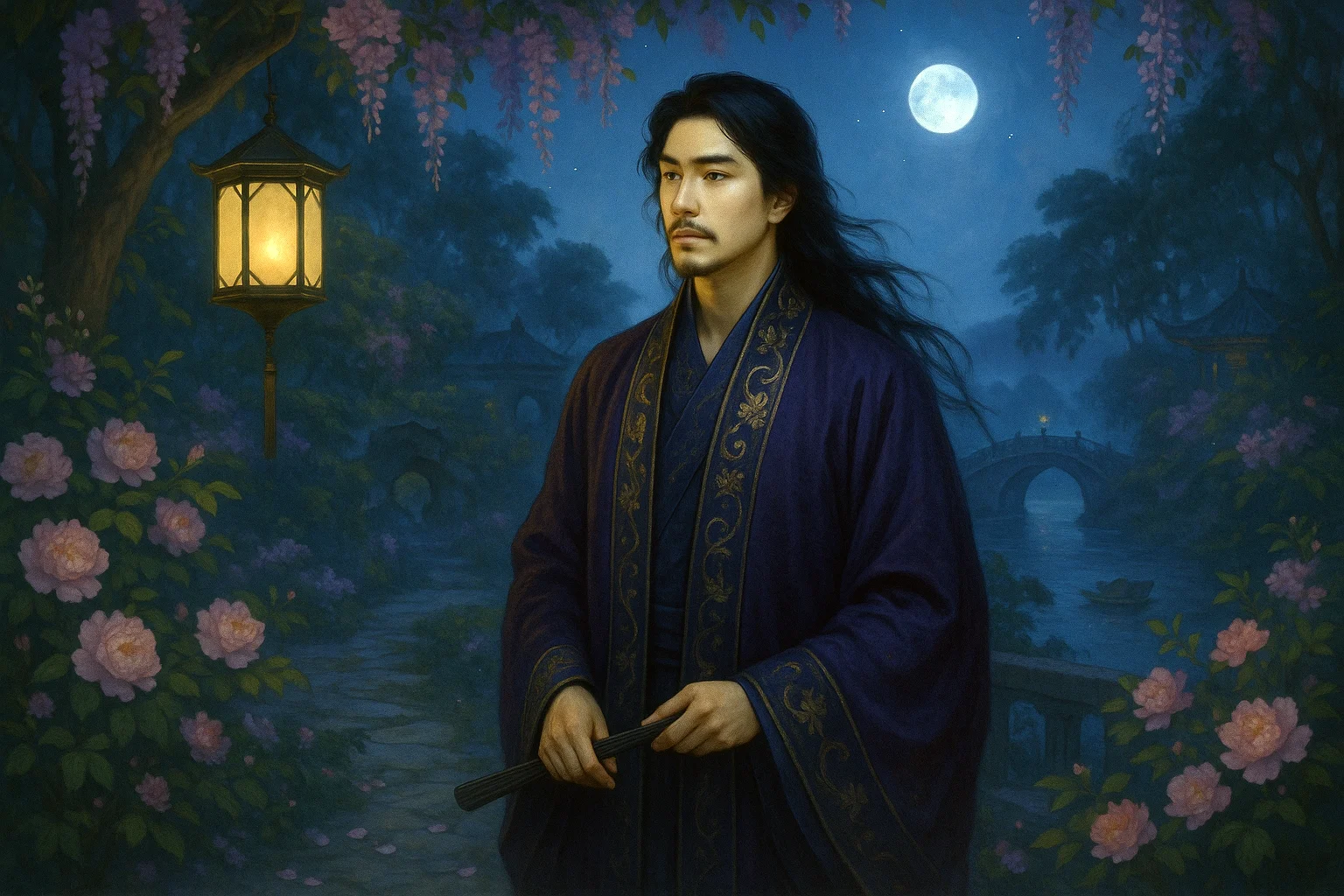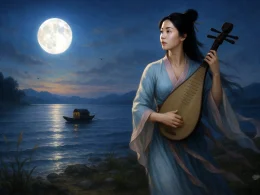Having caressed the dancers in the vernal breeze,
You're ravished amid the merry-making trees.
How can you wail until clear autumn days are done
To shrill like poor cicadas in the setting sun?
Original Poem
「柳」
李商隐
曾逐东风拂舞筵,乐游春苑断肠天。
如何肯到清秋日,已带斜阳又带蝉。
Interpretation
This poem was composed in the poet’s later years. It stands as the piece with the most condensed symbolic system and most intense personal resonance among Li Shangyin’s object-poems, and can also be read as a miniature spiritual autobiography of his entire life. Taking the "willow" as its sole protagonist, and through multiple contrasts between spring and autumn, day and night (the setting sun), sound and silence (the cicada’s cry), the poet constructs a model of precipitous decline—from glorious zenith to extreme decay, from center to periphery, from joyous dance to sorrowful lament. The poem’s four lines resemble a life tragedy playing in fast-forward, expressing the individual’s vicissitudes of fortune and the absurdity of existence within the tides of time with both breathtaking intensity and bone-chilling clarity.
First Couplet: 曾逐东风拂舞筵,乐游春苑断肠天。
Céng zhú dōngfēng fú wǔ yán, lè yóu chūn yuàn duàn cháng tiān.
You once pursued the spring breeze, brushed the banquet’s dancing swirls,
In the Joyous Garden’s park, on a heart-rending spring’s day.
Explication: Opening with a tone of reminiscence, it sketches the most resplendent moment in the willow’s (and the poet’s own) life. "Pursued the spring breeze" suggests active striving and wholehearted immersion; "brushed the banquet’s dancing swirls" clarifies its place at the heart of power and revelry. "The Joyous Garden’s park" refers both to a specific location (a famed site in Chang’an of the Tang) and symbolizes a golden age of youth, favor, and boundless possibility. However, the three words "heart-rending spring’s day" seep in like a shadow: this intoxicating spring light, precisely because it is fated to pass, inherently contains the tragic seed of "heart-rending." The foreboding that the feast must end sows the seed for the stark turn below.
Final Couplet: 如何肯到清秋日,已带斜阳又带蝉。
Rúhé kěn dào qīng qiū rì, yǐ dài xié yáng yòu dài chán.
How could you bear to come to clear autumn days, to be
Laden with the setting sun’s last rays, burdened with the cicada’s dirge?
Explication: This couplet, with its strong rhetorical question and layered imagery, pushes the scene of decline to its extreme; it is the soul of the poem. "How could you bear to come" is a rebellious query and a struggle against fate, highlighting the involuntary, forced descent from spring to autumn. "Clear autumn days" stands in contrast to "spring’s park," a complete reversal of time and life state. "Laden with the setting sun’s last rays, burdened with the cicada’s dirge" is like two layers of shackles, compounding the weight: the "setting sun" is visually the twilight, the fading, the cold final glow; the "cicada" is aurally the shrill, desolate, dying swan song. The word "laden/burdened" is passive and heavy, as if these marks of decay are shame and pain imposed upon it. The "stillness" of the setting sun and the "sound" of the cicada’s cry together weave an inescapable net of decline.
Holistic Appreciation
This is a "poem of life’s acceleration," its structure like a rock falling from a cliff, its emotion like the searing alternation of ice and fire. The poem employs the simple contrasting framework of "once" versus "now," yet, due to the extremely typical choice of imagery and the absolute disparity in emotional tenor, it achieves a stunning effect. The first two lines depict the willow’s spring "glory" to the extreme: the east wind (assistance), the banquet (setting), the Joyous Garden (status), the heart-rending day (intense emotion)—it is an all-encompassing, high-saturation peak experience. The last two lines depict the willow’s autumn "decay" to the extreme: clear autumn (desolation), "bear to come" (reluctance), the setting sun (dead end), the cicada (lament)—it is a multi-dimensional, low-pressure portrait of extremity. From the active "pursued" to the passive "laden/burdened," it completes the entire process of life’s agency shifting from assertion to deprivation.
Li Shangyin’s profundity lies in not simply using the willow as a metaphor for himself to express the lament of unrecognized talent. Through the image of the "willow," he reveals the absolute fragility and helplessness of individual destiny before grand historical cycles and natural laws. The willow’s "pursuit" of the spring breeze—is it not the scholar-official’s full embrace of the era’s opportunities? The willow’s "brushing" the banquet—is it not talent’s brief brilliance in the arena of power? Yet, the east wind will cease, the banquet will end, and the Joyous Garden in spring ultimately becomes a "heart-rending day." When the "clear autumn days" inevitably arrive, the tension between "could you bear" and "laden with" speaks volumes of the bewilderment after the fact and the powerlessness in the moment shared by all participants in that splendor. This is not merely Li Shangyin’s personal elegy but resonates with countless souls lifted and then cast aside by the tides of their time.
Artistic Merits
- Extreme Opposition and Sudden Transformation of Imagery: "Spring breeze" versus "clear autumn," "banquet’s dancing swirls" versus "setting sun… cicada’s dirge"—between these images exists an absolute opposition of warmth and cold, clamor and solitude, center and periphery. The connection "How could you bear to come" makes this transformation seem abrupt, violent, and incomprehensible, intensifying the sense of life’s absurdity.
- The Emotional Weight of Verbs: “Pursued” suggests spirited striving; “brushed” conveys graceful, poised presence; “bear to come” implies reluctant, passive arrival; and “laden/burdened” speaks of a weight helplessly carried. These four verbs trace the steep curve of a life shifting from active pursuit to passive endurance.
- The Foreshadowing and Irony of "heart-rending spring’s day": While depicting the ultimate spring scene, the first couplet embeds the words "heart-rending spring’s day"—a masterful use of foreshadowing. It prematurely reveals the feast’s tragic end, casting a layer of illusory shadow over the present splendor, producing the multiplied effect of "writing sorrow within a joyful scene."
- The Symphony of Decline in Sound and Sight: The final line, "Laden with the setting sun’s last rays, burdened with the cicada’s dirge," superimposes visual dimness (setting sun) and aural desolation (cicada), constructing a multi-sensory, three-dimensional scene of decline, making the feeling of desolation more immersive and oppressive.
Insights
This work is like a requiem for all who have experienced life’s peaks and valleys. It reveals that life’s trajectory is often not determined by the individual’s "bearing" or "not bearing"; the shift from spring breeze to clear autumn is often the merciless operation of the era’s climate and natural law. The willow branch that once brushed the "banquet’s" edge must eventually face the autumn of the "setting sun" and the "cold cicada." This sense of fate reminds those in favorable circumstances to be wary of the foreshadowing within the "heart-rending day" and comforts those in adversity with the understanding that this fall is not theirs alone.
Today, as individual fate remains bound to grand historical narratives, the poem’s metaphorical power endures. It moves us to consider: how does one face life’s passage from center to periphery, from vigor to desolation? Does one sink into bitterness over “how could you bear,” or, recognizing the plight of being “laden with the setting sun, burdened with the cicada’s dirge,” still seek a way and a meaning to exist? Li Shangyin’s willow gives no final answer, but in its distilled poetic form, it captures the lasting tremor and deep compassion born of life’s sudden fall, allowing readers across time, through empathy, to reflect on their own place within their era and their fate.
Poem translator
Xu Yuan-chong (许渊冲)
About the poet

Li Shangyin (李商隐), 813 - 858 AD, was a great poet of the late Tang Dynasty. His poems were on a par with those of Du Mu, and he was known as "Little Li Du". Li Shangyin was a native of Qinyang, Jiaozuo City, Henan Province. When he was a teenager, he lost his father at the age of nine, and was called "Zheshui East and West, half a century of wandering".












